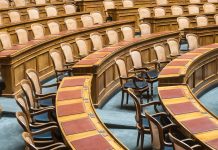In the wake of a contentious Culver City Unified School District Board of Education meeting that left the possibility of voters casting ballots for or against a school bond measure in serious jeopardy, some community leaders are suggesting the attention now shifted to reinstating a popular parcel tax measure.
In 2009, voters passed Measure EE, a parcel tax measure that added $96 to the property rolls in Culver City in 2009. The parcel levy raised $1.2 million dollars annually to help offset potential reductions in programs and personnel at the school district.
It passed with nearly 80% of the vote, a significant number considering that parcel measures require a two-thirds threshold for passage.
On July 1, the school board passed on moving forward with a vote to authorize having a school bond measure in November, when the board holds its election. Vice President Patricia Siever was joined by Karlo Silbiger and Nancy Goldberg in asking for more time to analyze the data collected from the consultant who was hired to conducted a survey of likely voters to gauge the potential interest, or lack thereof, for a bond.
The have said there is still an opportunity for a June or November bond proposal for next year.
“We should absolutely be looking at renewing Measure EE,” asserted former CCUSD board member Steven Gourley when ask his thoughts in light of the unlikely possibility that the board would decide to move forward with a bond measure.
Leslie Gardner thinks the board should reconsider the school bond for this year, citing many of the same reasons supporters of the capital works initiative have. “We haven’t spent large chunks of money on our school buildings in a long, long time,” noted Gardner, the president of all Culver City Parent-Teacher Associations. “(Without a bond), I don’t see any other way to fix our facilities.
“I hope that certain people don’t try and quash (the bond proposal) in order to pass Measure EE.”
Siever thinks the board should explore whether or not to continue Measure EE instead of pursuing a bond measure for this year. “I think you have to look at Measure EE, because as board members, we have to look at the bigger picture,” Siever said.
Gardner said Culver City’s electorate has long been supportive of local school enhancements as evidenced by a capital improvements bond in 1996, so there could be an opportunity to have both the parcel tax and the bond proposal for November.
“I think Culver City is the kind of city that can support Measure EE too,” she said.
Board member Laura Chardiet says the longer the board waits, the more it will cost to repair the district’s facilities. “Interest rates will be going up next year as well as construction costs,” she said. “Why do we need to wait? What more do we need to know about the condition of our schools?”
Claudia Vizcarra, a Culver City homeowner, took the survey but found it somewhat complicated. She also thinks that Superintendent David LaRose and his staff should have been clearer in outlining the district’s infrastructure priorities instead of leaving that to the residents.
“How does he expect me as a parent to know which is an immediate priority, whether it’s a sports field or something else?” asked Vizcarra, whose son attends Culver City Middle School.
Robert Zirgulis, who is running for a seat on the board for the third time, would also like to see the parcel tax reinstituted. “The board should do something about how to get Measure EE on the ballot at some point,” he said.
Zirgulis also supports the proposed capital improvements bond and chastised the members who did not back having it on this year’s ballot.
“It’s really a shame that they didn’t allow the vote,” said the substitute teacher.
Chardiet would also like to see Measure EE as well as the bond initiative go forward but pointed out the distinction between each measure’s purpose. “We should do both. But the parcel tax was intended to help our instructional programs and the bond is for capital improvements,” she noted.
Supporters of the having a vote on a capital enhancement bond have been busy rallying support for a special meeting to move toward a vote to authorize it, but there appears to be little chance of that happening before the Aug. 9 deadline as summer vacation plans are being made and Silbiger, Goldberg and Siever have shown little or no inclination to meet again before the next scheduled meeting, which is Aug. 29.
“I think September would be a good time to have some meaningful discussions about what our infrastructure priorities should be,” Siever said, who added that she and the other board members have never said they were against a bond proposal. “The survey did not have a detailed analysis of priorities and that is what I would like to see, as well as hear from the residents, who we would be asking to pay for this bond.
Vizcarra, who works for a member of the board of education of the Los Angeles Unified School District, disagreed with those who have criticized the trio who were unwilling to move forward with a bond initiative without more data.
“I feel like we can never have urgency about making rushed judgments when you are asking residents to tax themselves,” she asserted.
Siever had previously stated that she did not have an opportunity to see the survey and that influenced her decision.
Gourley, who is also a former Culver City mayor and says he has not formed an opinion on a possible capital improvements bond, said he would not have taken action on anything as a school board member without having first seen and read it, including the school bond survey. “That would indicate to me that (a board member) does not care about or consider input from the community,” said Gourley, an attorney. “I expect those who are in the position of decision-making to study anything that comes before them first before voting on it.”
Chardiet still holds out hope that an agreement can be reached on a school bond. “I believe in miracles,” she said.













